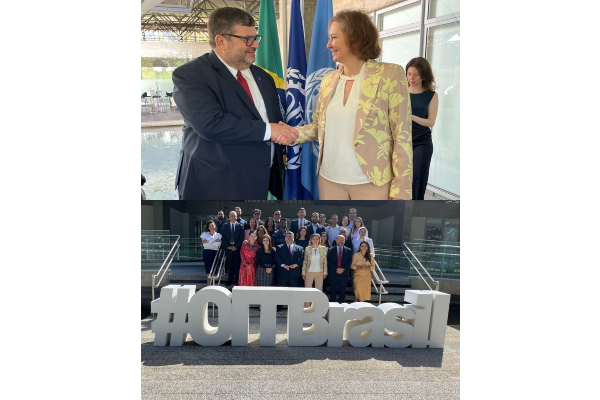
Brasilia, 24 April 2025 — From April 22 to 24, the city of Brasilia hosted the BRICS Emerging Technologies and New Frontiers for Employment for Just Transitions – DEVTECH / PARTNERSHIPS South-South Knowledge-Sharing Event, bringing together over 20 experts, government officials, researchers, and development practitioners from BRICS+ countries. The event was co-organized by the Ministry of Labour of Brazil, the International Labour Organization (ILO), and the International Training Centre of the ILO (ITCILO) as part of Brazil’s 2025 BRICS Presidency. The opening was ensured by Brazilian Secretary of Labour relations Marcos Perioto, ILO assistant director general Laura Thompson, BRICS EWG Chair Maira Lacerda and ILO director Vinicius Pinheiro.
The event culminated today at the ILO Office in Brasilia, in conjunction with the opening of the BRICS Technology and South-South and Triangular Cooperation Knowledge Sharing Platform on Artificial Intelligence and the World of Work, on the eve of the 11th BRICS Labour and Employment Ministers’ Meeting.
Held under the theme of “Artificial Intelligence and the World of Work”, this three-day programme explored the transformative potential of digital technologies—including artificial intelligence, biotechnology, renewable energy, and data analytics—for job creation, especially in rural economies. Participants developed action plans for inclusive, technologically-driven employment strategies tailored to the realities of the Global South.
The event emphasized the urgent need for human-centred digital transformation in rural areas, where disparities in access to technology risk widening existing social and economic divides. With a focus on South-South and Triangular Cooperation (SSTC), the event underscored how developing countries can co-design and implement solutions by leveraging shared experiences and capacities.
The ILO Assistant Director General Laura Thompson highlighted its recently launched Artificial Intelligence Observatory, which aims to:
• Serve as a global knowledge hub on the world-of-work dimensions of AI and the digital economy;
• Support governments and social partners in navigating the digital transformation of work;
• Conduct research and organize events to advance ethical, inclusive and rights-based innovation.
“In the spirit of South-South and Triangular Cooperation—as a strategic platform for collaboration among equals—BRICS countries are well-positioned to drive people-centred innovation and ensure no one is left behind,” said Mrs Thompson. “Emerging technologies must work for everyone, especially the most vulnerable through South-South peer learning”
Anita Amorim & Diana Chavez , ILO PARTNERSHIPS, and Participants at the DEVTECH/PARTNERSHIPS event engaged in group work, case study analysis, and interactive sessions to:
• Define ideal future employment scenarios for rural economies;
• Identify emerging technologies with job-generating potential;
• Analyze disruptive macro-trends and propose countermeasures;
• Explore best practices from BRICS+ countries and the wider UN development system;
• Develop action plans and forge twinning partnerships for sustained South-South collaboration.
Key takeaways and proposals from this South-South initiative were formally presented this morning to the BRICS Employment Working Group, providing inputs to the upcoming Declaration of the 11th BRICS Labour and Employment Ministers’ Meeting.
Joel Alcocer, ITC Turin , reiterated its commitment to supporting BRICS+ countries in implementing these recommendations and fostering inclusive digital transitions in labour markets across the Global South.

